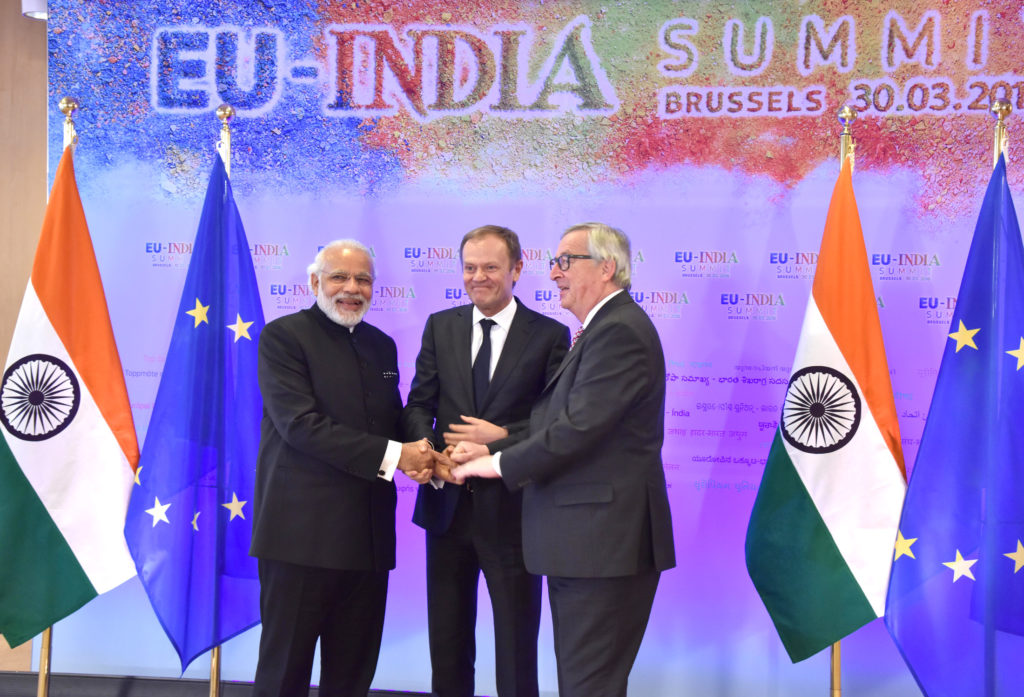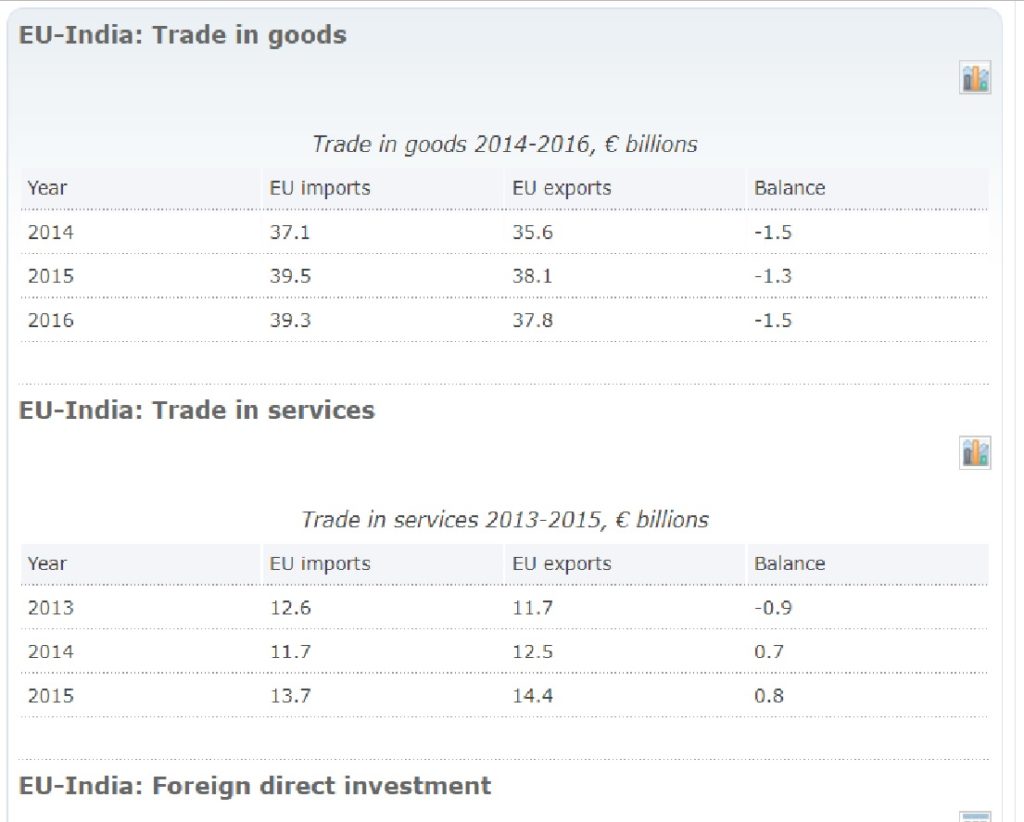India – Europe business outlook
While mixed expression of India’s positive economic growth against the momentary holdup post demonetisation and Goods and Services Tax (GST) attract global eyeballs, the trade figures with Europe, one of the most organised markets in the world depicts growth despite challenges. Will the pessimism get replaced by a recoil ushering new business avenues between Indian and Europe?
As India positions itself with an improved economic outlook, the Indian companies trying to expand their trade in Europe have gradually identified a niche demand for Indian products, according to a Federation of Indian Chambers of Commerce and Industry (FICCI) report.
The European Commission (EC) in their study finds the value of EU imports from India have also increased from EUR 22.6 billion in 2006 to EUR 39.3 billion in 2016. The textiles and clothing, chemicals and engineering goods related businesses by Indian entrepreneurs in Europe have performed the best in during the last analysed period. However, in 2015, the EU import from India was EUR 39.5 billion; and the momentary slowdown is allegedly attributed to the novel economic reforms.
The dynamic and huge market of India with 1.25 billion people is deemed as a major strategic partner of the EU according to the European Commission. The EU and India post the Free Trade Agreement negotiations launched in 2007 have further increased their bilateral trade and investment. However, the current focus remains on the outstanding issues including improved market access for some goods and services, government procurement, geographical indications, sound investment protection rules and sustainable development, the EC report on trade policy with India summarises.
EC stats on India-EU trade
The EU is India’s number one trading partner (13.5 pc of India’s overall trade with the world in 2015-16), well ahead of China (10.8 pc), USA (9.3 pc), UAE (7.7 pc) and Saudi Arabia (4.3 pc).
India is the EU’s 9th trading partner in 2016 (2.2 pc of EU’s overall trade with the world), after South Korea (2.5 pc) and ahead of Canada (1.9 pc).
The value of EU exports to India grew from EUR 24.2 billion in 2006 to EUR 37.8 billion in 2016, with engineering goods, gems and jewellery, other manufactured goods and chemicals ranking at the top.
The value of EU imports from India also increased from EUR 22.6 billion in 2006 to EUR 39.3 billion in 2016.
Trade in services almost tripled in the past decade, increasing from EUR 10.5billion in 2005 to EUR 28.1 billion in 2015.
EU investment stocks in India amounted to EUR 51.2 billion in 2015, increasing from EUR 44.2 billion in the previous year.
FICCI survey hopes rebound
FICCI in a recent report based on an internal survey stated that there has been a considerable rise in the number of companies who have successfully been able to reduce their losses while doing business in the region. The FICCI survey on “Are Winds of Change Bringing Good Tidings for Indian Companies Doing Business in Europe” notes that the current economic situation, though resulting in a number of procedural and regulatory obstacles for Indian companies to expand and or do business in the continent, is still providing needed returns on the investments made.
Considering the 27 countries (28 if we also consider the United Kingdom) as a single market, Europe is the biggest consumer base with close to 500 million potential consumers. Europe, a lucrative market as it readily embraces new foreign investment with the outlook of promoting employment and capital formation.
The FICCI report says, “The ongoing negotiations to sign an equitable and balanced FTA between India and the EU are also closely monitored by Indian industry. The issue of visas and movement of professionals in the EU still remains one of the most contentious concern areas for Indian companies.”
The developed capital market, political and social stability in most of the EU nations and a transparent trade law remains the other promising factors to inspire Indian companies to open shop in Europe.
Some of the major findings in the FICCI survey show a positive change in the mindset of the respondents. From 2015 when 75 pc of Indian companies surveyed had responded that the ongoing crisis had resulted in their business prospects in the region being adversely impacted, this year 25 pc of the surveyed companies expressed concerns about their business prospects taking a hit due to the current economic scenario in Europe.
Over 65 pc of companies surveyed by FICCI noted that even when the markets were slow in registering increased domestic demand, they have been able to register growth in their product(s) category. Most significantly 61 pc of the surveyed companies who reported an increase in their business prospects, their losses have come down from 20 pc in 2015 to less than 5 pc this year. 18 pc respondents reported an increase of 2-5 pc in their businesses.
Challenges still remain
The lesser talked about side of the story behind India’s relative lack of success compared to the other Southeast and East Asian countries in the European market revolves around the failure of policies that would enable India’s small and medium business owners to capitalise global opportunities. The micro, small and medium enterprises (MSMEs) in India are still struggling to find a way to manage high transaction costs and trade facilitation issues as they lack the monetary backup or a better political network.
The lagging small and micro industries in India are still waiting for a simplified regulation while connecting to the global markets and the reduction of transaction costs allowing a more enterprise-friendly regime.
The EC throws light on how India has embarked on a process of economic reform and progressive integration with the global economy aiming a rapid and sustained growth. However, it also states how the country’s trade regime and regulatory environment remains comparatively restrictive in terms of the World Bank’s Ease of Doing Business Report or EC’s report on Trade and Investment Barriers and Protectionist Trends that states, “India still features amongst the four countries with the highest number of new Relevant Measures.











